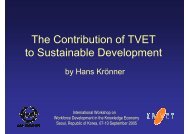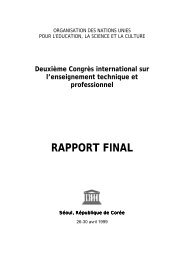Learning for Life, Work and the Future Initial ... - Unesco-Unevoc
Learning for Life, Work and the Future Initial ... - Unesco-Unevoc
Learning for Life, Work and the Future Initial ... - Unesco-Unevoc
You also want an ePaper? Increase the reach of your titles
YUMPU automatically turns print PDFs into web optimized ePapers that Google loves.
Page 68 Participants’ Papers <strong>Learning</strong> <strong>for</strong> <strong>Life</strong>, <strong>Work</strong> <strong>and</strong> <strong>the</strong> <strong>Future</strong><br />
The United States In<strong>for</strong>mation Service (USIS) provided<br />
assistance to run workshops <strong>for</strong> <strong>the</strong> training of<br />
DACUM facilitators <strong>and</strong> <strong>the</strong> development of<br />
curriculum materials.<br />
The Government of Australia provided fellowships <strong>for</strong><br />
<strong>the</strong> training of managers in <strong>the</strong> Management of<br />
Training Institutions as well as curriculum developers.<br />
Assistance was obtained to start <strong>the</strong> training of Heavy<br />
Goods Vehicle drivers as well as <strong>the</strong> setting-up of<br />
training in Automotive Mechanics.<br />
The Belgians carried out a study to start systematic<br />
training of maintenance mechanics <strong>and</strong> technicians.<br />
Assistance was obtained from Canada to start training<br />
in Plastics <strong>and</strong> <strong>the</strong> computerisation of <strong>the</strong> IVTB.<br />
In addition <strong>the</strong> IVTB established links with Germany,<br />
UK, France, Belgium, Italy, India, Hong Kong, Singapore,<br />
<strong>the</strong> ACCT, <strong>the</strong> ILO <strong>and</strong> <strong>the</strong> IIEP <strong>for</strong> training in<br />
Electronics, Printing, Hotel <strong>and</strong> Catering, Maintenance<br />
Mechanics, Precision Engineering, Textile <strong>and</strong> Garment<br />
Making <strong>and</strong> Merch<strong>and</strong>ising, Curriculum Development,<br />
Maintenance of Industrial Machines, Training<br />
of Trainers <strong>and</strong> Management of Training Institutions,<br />
<strong>and</strong> <strong>for</strong> sharing of experiences respectively.<br />
4. Co-ordination of Donor Assistance<br />
All <strong>the</strong> above activities were planned <strong>and</strong> implemented<br />
between 1991 <strong>and</strong> 1996. The IVTB itself played <strong>the</strong><br />
role of co-ordinator of <strong>the</strong> assistance provided by <strong>the</strong><br />
large number of donors. The ultimate effect was to<br />
improve <strong>the</strong> quality of training in general <strong>and</strong> <strong>the</strong> provision<br />
of training in fields not previously available.<br />
The clear vision of <strong>the</strong> IVTB had provided <strong>the</strong> lead <strong>for</strong><br />
<strong>the</strong> donors to play <strong>the</strong>ir roles successfully, in full<br />
awareness of <strong>the</strong> participation of <strong>the</strong>ir colleagues in <strong>the</strong><br />
promotion of training in Mauritius. There was no<br />
duplication <strong>and</strong> no wastage. The IVTB became a<br />
success story.<br />
5. Change at Management Level<br />
However, early in 1996, a change occurred at <strong>the</strong><br />
senior management level. A new Council was constituted<br />
<strong>and</strong> a new Director assumed duty. The new<br />
team spent a lot of time criticising whatever had been<br />
done be<strong>for</strong>e. It lacked a sense of direction, <strong>and</strong> several<br />
projects proposed <strong>for</strong> <strong>the</strong> development of training were<br />
dropped. For example, <strong>the</strong> World Bank loan <strong>for</strong> <strong>the</strong><br />
establishment of a resource centre was found to be<br />
superfluous <strong>and</strong> was cancelled. Studies were commissioned<br />
<strong>and</strong> seminars <strong>and</strong> workshops were held to<br />
find <strong>the</strong> way ahead.<br />
Ultimately it was found that <strong>the</strong> IVTB had too many<br />
roles: it was a funding agency, a provider of training<br />
<strong>and</strong> a regulator of training. It was also found that <strong>the</strong>re<br />
was a conflict of interests <strong>and</strong> too many functions <strong>for</strong><br />
one Directorate. Different proposals have been made<br />
to find a solution to better define <strong>the</strong> organisation(s)<br />
that should be involved in training.<br />
There is no perfect organisation. As seen from <strong>the</strong><br />
above, initially <strong>the</strong> different roles were successfully<br />
h<strong>and</strong>led by one organisation. The change to a new<br />
style of management, in this case, slowed down <strong>the</strong><br />
activities of <strong>the</strong> organisation <strong>and</strong> created confusion<br />
amongst its staff. Sometimes precious time is wasted<br />
in finding fault instead of taking decisions <strong>and</strong> moving<br />
ahead.<br />
The above clearly portrays how <strong>and</strong> under what<br />
circumstances donor assistance can be effectively used<br />
<strong>and</strong> be of benefit to <strong>the</strong> country.<br />
6. The Role of Donors<br />
Donors are very supportive of projects/programmes<br />
that <strong>for</strong>m part of a whole <strong>and</strong> are not a set of disjointed<br />
activities implemented in <strong>the</strong> name of TVET. However,<br />
<strong>the</strong>ir actions have to be co-ordinated to avoid<br />
duplication <strong>and</strong> wastage. Thus an autonomous body<br />
responsible <strong>for</strong> vocational training greatly facilitates<br />
<strong>the</strong> co-ordination function amongst <strong>the</strong> different<br />
donors. The body needs to have a clear vision <strong>and</strong> a<br />
team of competent <strong>and</strong> dedicated staff with <strong>the</strong> will to<br />
meet time-bound targets.<br />
In <strong>the</strong> absence of <strong>the</strong>se, many projects suffer during<br />
implementation, causing wastage. In several countries<br />
(e.g. Mozambique, Tanzania, Egypt) ef<strong>for</strong>ts are being<br />
made to co-ordinate <strong>the</strong> actions of <strong>the</strong> different donors.<br />
More often than not, <strong>the</strong> donors are trying through<br />
scheduled meetings to do this <strong>the</strong>mselves. But without<br />
local vision <strong>and</strong> commitment <strong>the</strong>se meetings are rarely<br />
successful.<br />
7. The Qualities of <strong>the</strong> Chief Executive Officer<br />
In <strong>the</strong> recent past in <strong>the</strong> developing world, <strong>the</strong> roles of<br />
government <strong>and</strong> <strong>the</strong> private sector were distinct, with<br />
little communication between <strong>the</strong>m. The last decades<br />
have witnessed a new type of relationship emerging in<br />
which <strong>the</strong>re is a desire <strong>for</strong> greater collaboration<br />
between <strong>the</strong> two sectors. However, how to turn that<br />
collaboration into a successful partnership is a big<br />
challenge. Organisations responsible <strong>for</strong> training are<br />
moving towards establishing such a partnership <strong>and</strong><br />
<strong>the</strong>ir management is becoming more complex. They<br />
are faced with a paradoxical situation in which <strong>the</strong>y are<br />
expected both to follow procedure, as in <strong>the</strong> public<br />
sector, <strong>and</strong> to be flexible <strong>and</strong> deliver, as in <strong>the</strong> private<br />
sector. At times, in addition to <strong>the</strong> political will, it is<br />
<strong>the</strong> qualities of <strong>the</strong> Chairperson <strong>and</strong> of <strong>the</strong> Chief<br />
Executive Officer (CEO) that determine <strong>the</strong> success of<br />
such a partnership.<br />
The leadership <strong>and</strong> management skills required of <strong>the</strong><br />
CEO are much beyond what is required in <strong>the</strong> public





